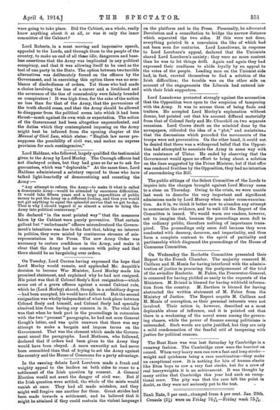On Tuesday, Lord Curzon having expressed the hope that Lord
Morley would remain, and applauded Mr. Asquith's decision to become War Minister, Lord Morley made his promised statement, and explained why he had not resigned. His point was that if Colonel Seely's first resignation—which arose out of a grave offence against a sound Cabinet rule, which he (Lord Morley) shared, though in a subsidiary degree —had been accepted, his would have followed. But the second resignation was wholly independent of what took place between Colonel Seely and himself, and Colonel Seely had specially absolved him from having any concern in it. The vital fact was that when he took part in the proceedings in connexion with the two "peccant " paragraphs, he had not seen General Gough's letter, and was quite unaware that there was any attempt to make a bargain and impose terms on the Government. That was the element which made the Govern- ment annul the paragraphs. Lord Methuen, who followed, declared that if orders had been given to the Army they would have been obeyed.. A more unworthy act had never been committed than that of trying to set the Army against the country and the House of Commons for a party advantage.














































 Previous page
Previous page